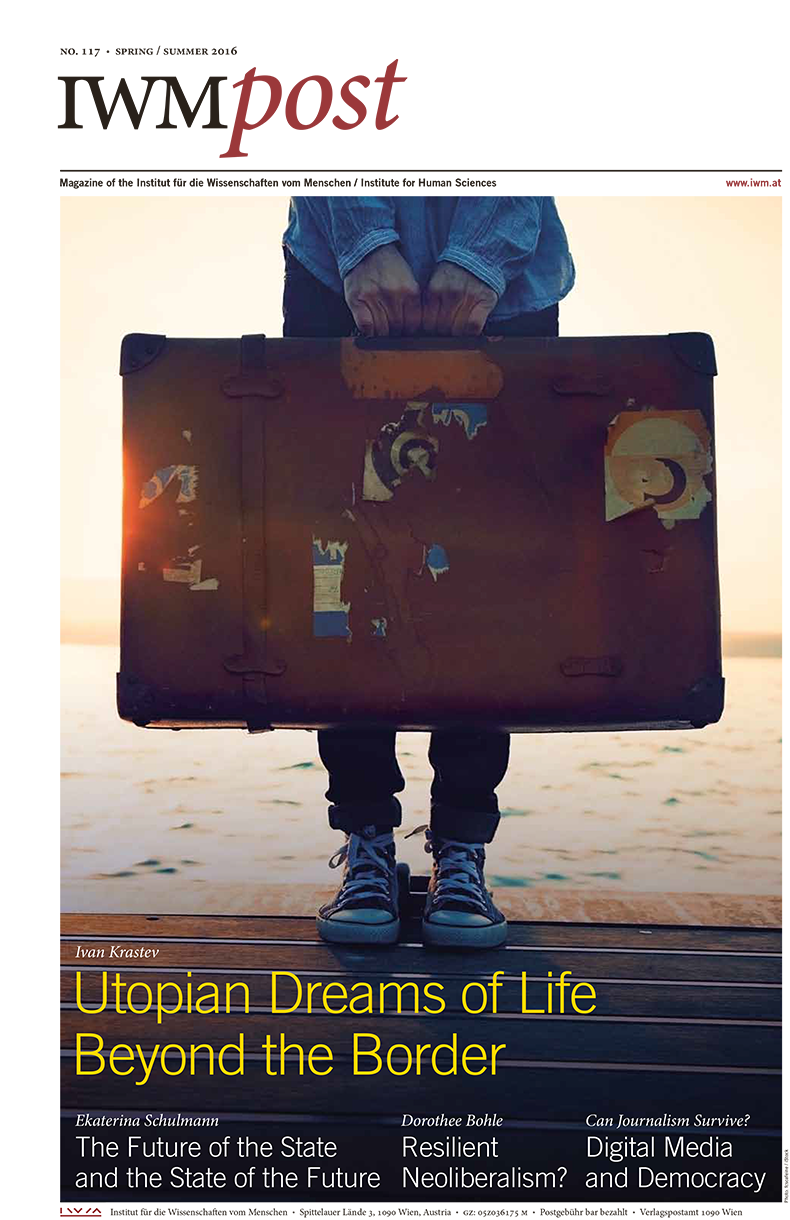Economic crisis, financial crisis, media crisis, Greek crisis, Ukrainian crisis, refugee crisis—it seems that the state of crisis has become the new normality. The current issue of the IWMpost takes a critical look at these developments and explores their interconnectedness.
Ivan Krastev argues that mass migration is the revolution of the 21st century, rapidly spreading thanks to digital media. In his opening article, he analyzes the refugee crisis’ impact on the stability of the European Union and on the relationships between its Eastern and Western member states.
The consequences of another crisis—the financial one—are addressed by Dorothee Bohle. Taking different countries’ policy responses to large-scale mortgage defaulting as a case study for comparing the variety of approaches to dealing with the crisis, she also explores why neoliberalism seems to have survived it unscathed.
At the same time, technological innovations, such as digital and social media, have utterly transformed the media business. In this issue, journalists from Germany, Macedonia, Romania, Russia and Turkey comment on the profound changes in their profession and show that whether these are perceived as a risk or an opportunity depends very much on a country’s specific political and social conditions.
Ekatarina Schulmann goes a step further and dares to peep into the future: How will states be governed and organized in 2030? Will the traditional nation-state dissolve in favor of a “new socialism”?
A crucial element setting the course for the future will be the outcome of the current negotiations between the US and the European Union on the Transatlantic Trade and Investment Partnership (TTIP). The arguments for and against were debated in the first of three Debating Europe panel discussions at the Vienna Burgtheater in 2016, and are summarized in this issue.
As André Liebich explains in his essay, diplomatic skills were also needed in 1918, when Czech philosopher and politician Thomas Masaryk succeeded in gaining allied support for an independent Czechoslovak state. Jakub Homolka’s interview with Klaus Nellen focuses on the legacy of another Czech philosopher, Jan Patočka, and the importance of his work for the IWM.
Last but not least, David Jenkins, Steven Lukes and Katherine Miller—the three inaugural Krzysztof Michalski Fellows at the IWM—report on their work together, using the cross-fertilization of philosophical, sociological and anthropological approaches to tackle questions of morality, social norms, and justice.
Download the IWMpost 117 as a PDF
Contents
Democracy in Question
Utopian Dreams of Life Beyond the Border / by Ivan Krastev
From the Fellows
Can Journalism Survive? Digital Media and the Future of Democracy / Comments by Vlad Odobescu, Sašo Ordanoski, Gemma Pörzgen, Maria Stepanova and Güney Yildiz
The Future of the State and the State of the Future / by Ekaterina Schulmann
Resilient Neoliberalism? / by Dorothee Bohle
No Self-Determination without Justification / by André Liebich
The Right Thing to Do: Ethics and Moral Dilemmas / by David Jenkins, Steven Lukes and Katherine Miller
Europa im Diskurs
TTIP: Freihandel auf Kosten der Demokratie? / Zusammenfassung von von Marion Gollner
Events in Retrospect
Tischner Debate
Religion, Solidarity and the Limits of Belonging / Report by Paweł Marczewski
Photo Exhibitions at the IWM
Fellows and Guests
IWM Patočka Archiv
„Patočka ist gestorben. Wir müssen etwas tun!“ / Interview mit Klaus Nellen von Jakub Homolka
Varia
Publications
Books, Articles and Talks
Upcoming Events

